George MacKay: ‘It’s funny that to promote a film about climate change you have to fly all over the place’
The English actor could easily fit the mold of a typical star, but he steers clear of mainstream projects. He proves this in post-apocalyptic musical ‘The End’
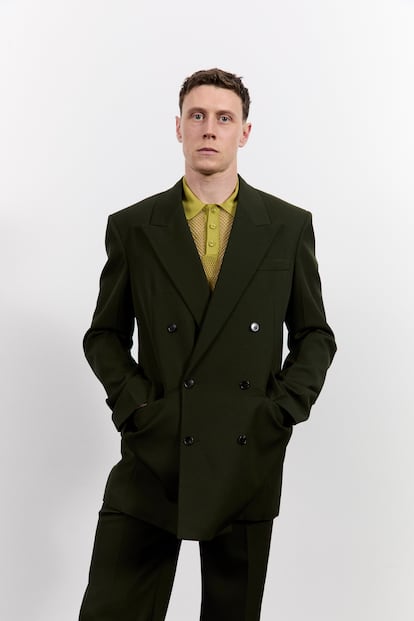
In the space of just over a year, George MacKay, 32, has played a repressed homophobic thug in Femme, an incel obsessed with Léa Seydoux in The Beast, and a young man whose entire life has been confined to a luxury bunker, and begins to question the nature of existence in The End.
The first feature movie from acclaimed documentary filmmaker Joshua Oppenheimer (The Act of Killing, The Look of Silence) is an elegant and classic post-apocalyptic musical, but the British actor is not afraid of a challenge. The range of roles he has taken on and the kind of projects and directors he has worked with over 20 years of experience are so diverse and unconventional that they help explain why someone with his talent and looks isn’t just another typical movie star.
Discovered at age 11 during a school theater class, MacKay ended up playing one of the Lost Boys in P.J. Hogan’s Peter Pan. Since then, he has steered clear of the media circuit and mainstream projects. Speaking via video call from the bedroom of his London home, the actor insists that none of it is intentional. Though he doesn’t state it outright, his words reveal that this unusual path has a lot to do with his deep love of cinema. Because, although not all actors are passionate about film, MacKay clearly is — he feels a true fascination for his craft, an art form to which he hopes to contribute by telling unique stories with directors beyond the English-language world.
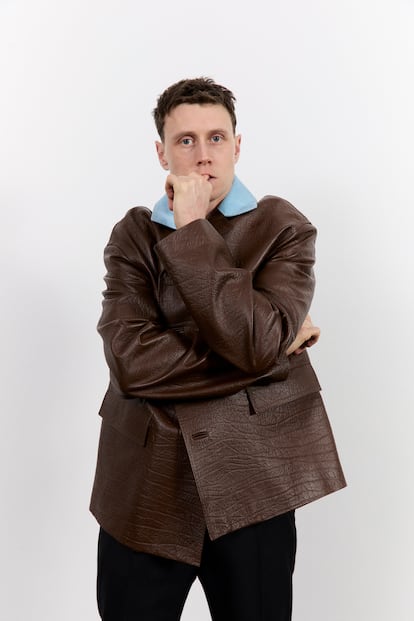
The British actor spoke to us just before unveiling the Gucci campaign he stars in — directed by the enfant terrible of Francophone cinema, Xavier Dolan — and during a break from filming his next movie: & Sons, directed by Argentine filmmaker Pablo Trapero (The Clan), written by Canadian Sarah Polley (My Life Without Me, Women Talking), and co-starring Bill Nighy and Matt Smith. Clearly, George MacKay is drawn to a different kind of cinema.
Question. From the outside, it seems like your career hasn’t followed the typical path — has that been a conscious decision?
Answer. I’d say it’s a mix of things. I’ve been very lucky, and over the years my criteria have changed. Sometimes, if I didn’t know the work of the director or the team involved, what drew me in was a really powerful story. But other times, it’s been about who I’d get to work with. If you truly admire a writer or director, the story becomes secondary — it’s the chance to collaborate with them that matters. And also, I enjoy independent cinema because it offers a different way of telling stories.
Q. And within these independent circles, do directors now come looking for you, or do you still go through the usual casting process?
A. Again, it’s a bit of both. With Bertrand Bonello, for example, I wasn’t familiar with his work before the opportunity to audition for The Beast came along. But once they contacted me, I started watching his films and saw that he was such a prominent French auteur, that Léa Seydoux was involved, and that it was a very different story… I wanted to do it no matter what. Although the role came to me under sad circumstances [it was originally meant for Gaspard Ulliel, who passed away in a skiing accident], I immersed myself completely in Bonello’s cinema and way of working. Because if there’s one thing I like about this job, it’s putting myself in the hands of directors with a very particular and distinctive aesthetic and vision.
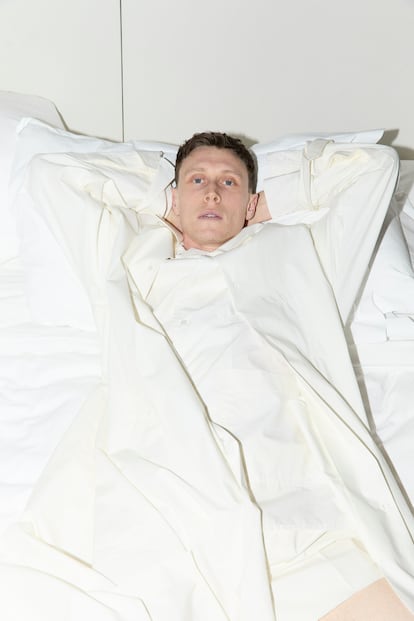
Q. Did Joshua Oppenheimer approach you to star in The End?
A. Yes, I was lucky enough to be offered the role by Joshua. His film The Act of Killing blew my mind, and I knew that doing a post-apocalyptic musical with him would be something truly special. Along with the script, he sent us a lookbook and a document laying out his vision for the film, and it was so eloquently expressed… And not only was I going to work with Tilda Swinton and Michael Shannon, when I joined the project, Mikhail Krichman was already also confirmed — the same cinematographer behind Leviathan (2014) and Loveless (2017), two films that were profound cinematic experiences for me.
Q. It sounds like you’re a film buff.
A. Yeah, I don’t know [smiles]. Lately, since I became a father, I haven’t been able to go as much, but when I was single and didn’t work like I do now, I used to go to the movies a lot. Movies like Leviathan appealed to me, and I couldn’t explain why. They’re just awesome. I just want to be surrounded by people who’ve made good movies.
Q. The End doesn’t have an easy tone.
A. It’s a post-apocalyptic musical, a drama, almost a satire at times... Joshua’s vision and idea were very specific, and we had a lot of time to discuss it. They had the entire film storyboarded, so I knew it was going to be almost like a choreography, and I just had to know my part perfectly.
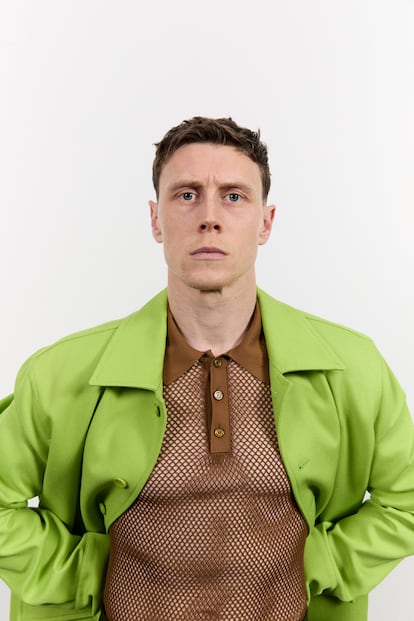
Q. And learn how to sing.
A. The whole musical team helped me with that part. And, in the end, it’s like when you have to go to the gym to gain weight or muscle for a role, it’s about exercising your voice.
Q. Oppenheimer says The End is a musical because he’s an optimist and wants to inspire audiences.
A. I think the film, among many other things, is an exploration of what separates hope from delusion. It’s about the stories we tell ourselves and how we tell them to help us make it through each day. It’s about how to be responsible for our own decisions as adults, both in society and personally. When the project started, I had just had my first daughter and was recalibrating everything I’d learned in life, finding my own way of doing things and navigating this capitalist society, finding balance, knowing how to take care of myself so I can take care of others. The End raises a lot of questions, but it doesn’t give all the answers. It’s funny that to promote a film about climate change you have to fly all over the place... but that’s precisely what it’s about, isn’t it?
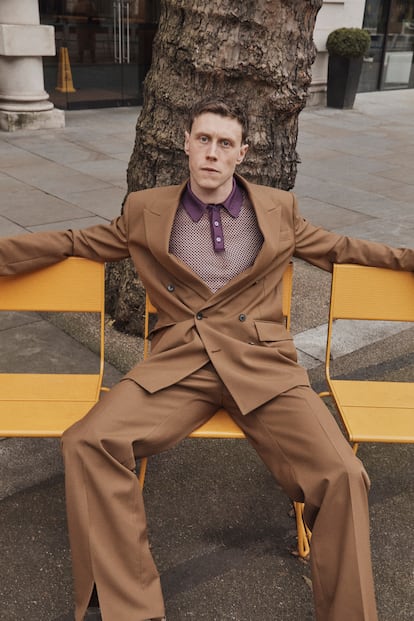
Q. You also talk about the traditional father figure... It’s interesting that the exploration of male identity has been a recurring theme in your recent work.
A. Yes, yes [laughs and shows his pink-painted nails to the camera], and I’m going to answer this question about masculinity with these nails painted by my daughter: it’s true, it’s a topic that interests me a lot. The idea of how to be a man changes in general and also through my own experiences. I think gender roles are being re-evaluated at the same time as the patriarchy. For me, it’s a constant question that I hope to continue exploring through my work and with all the men I work with. I’ve learned a lot from my characters, like in The True History of the Kelly Gang [Justin Kurzel, 2019], which was a portrait of hypermasculinity through these criminals wearing dresses, a macho man exploring a femininity that I hadn’t explored until that moment. When you finish a shoot like that, your world expands, and you have questions that don’t always have a single answer.
Q. 1917 by Sam Mendes, Captain Fantastic with Viggo Mortensen, the comedy Pride… Those are probably the films you’re best known for, and they also show your versatility.
A. Yes, I think they would be the three best-known films… Sometimes, you get lucky, when you keep choosing projects with integrity that also work for the audience.
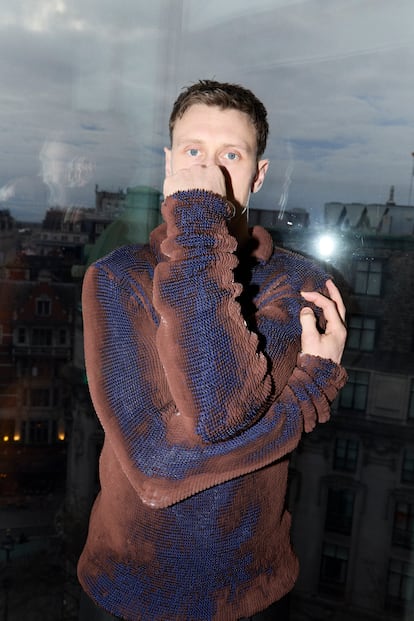
Q. In Spain, you are also remembered for Marrowbone (2017)…
A. Oh yes, Sergio [G. Sánchez], it was a very special project. I loved that film and we had a great time. It was also my first time at the San Sebastián Film Festival, where I returned with The End in September. This year, seeing films at festivals like that made me realize again how important the connection with the audience is.
Q. But precisely what you’ve avoided are the typical genres for mainstream audiences. You’ve never done a romantic comedy, for example.
A. It hasn’t been a conscious thing, but a mix of my taste for a more independent cinema, as I said, and also of roles that I have fought for and haven’t gotten [laughs]. Let’s be honest, there are many films that you put effort into and they don’t work out. But I don’t mind, because I think a lot about the audience, more and more, and achieving that connection doesn’t always mean it has to be a commercial film.
Q. But after 1917, which made it to the Oscars, didn’t the doors of Hollywood open for you?
A. Yes and no. To be honest, the doors that open for you after the Oscars close quickly. It’s a matter of trends. You can participate in that race and do well in terms of the industry and success, but you can also get lost in it all. In reality, I don’t think it lasts very long because it ends up depending on what other people find interesting and not what excites you. Yes, I had a moment when I stood out, but I feel luckier to be part of a film that can make a difference than because of that.
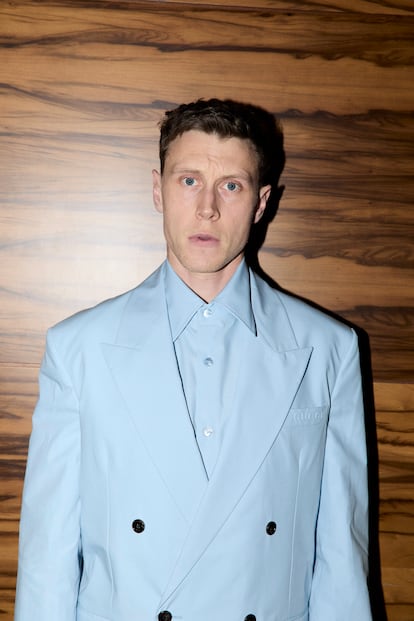
Q. Are you comfortable with the level of fame or success you have today?
A. I wouldn’t consider myself famous, so yes. It’s true that there are things about this profession that I’m not so comfortable with. But there are others I really like. On photoshoots, for example, I don’t have the safety net of a script or the time to develop a character, but I trust the creative minds of those who do them. This interview is the way I reach people. If I choose stories that I think are important, I’m grateful to be able to talk about them. I love talking about them.
Credits
Sign up for our weekly newsletter to get more English-language news coverage from EL PAÍS USA Edition
Tu suscripción se está usando en otro dispositivo
¿Quieres añadir otro usuario a tu suscripción?
Si continúas leyendo en este dispositivo, no se podrá leer en el otro.
FlechaTu suscripción se está usando en otro dispositivo y solo puedes acceder a EL PAÍS desde un dispositivo a la vez.
Si quieres compartir tu cuenta, cambia tu suscripción a la modalidad Premium, así podrás añadir otro usuario. Cada uno accederá con su propia cuenta de email, lo que os permitirá personalizar vuestra experiencia en EL PAÍS.
¿Tienes una suscripción de empresa? Accede aquí para contratar más cuentas.
En el caso de no saber quién está usando tu cuenta, te recomendamos cambiar tu contraseña aquí.
Si decides continuar compartiendo tu cuenta, este mensaje se mostrará en tu dispositivo y en el de la otra persona que está usando tu cuenta de forma indefinida, afectando a tu experiencia de lectura. Puedes consultar aquí los términos y condiciones de la suscripción digital.








































